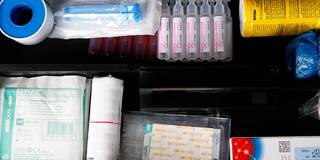Despite the obvious link between health outcomes and economic growth, global-governance bodies have neglected many of the core needs of health-care systems across the developing world. Worse still, they have become distracted by narrow battles over drug prices, when they should be finding ways to improve drug availability.
DÜSSELDORF – Around the world, health security is increasingly being recognized as the foundation of economic growth. Healthy populations are better able to produce, trade, and innovate, while unhealthy populations strain public budgets and create risks that discourage economic exchange. This logic is written into countless European Union reports, and is even gaining traction in the United States, despite the “America First” approach to international affairs embraced by President Donald Trump’s administration.
Against this backdrop, the World Health Organization (WHO), under its new Director-General, Tedros Ghebreyesus, has a unique opportunity to pursue urgently needed reforms. The WHO’s response to the 2014-2016 Ebola outbreak in West Africa was roundly judged a failure. And with the emergence of new diseases such as Zika – and the revival of old foes like bubonic plague – there is no question that much of humanity remains at the mercy of biology. Moreover, globalization has compounded the danger by facilitating the spread of communicable diseases. A flu outbreak like that of 1918-1920, which killed between 50 and 100 million people, would be even more devastating today.
To prevent such catastrophic outcomes, we need a comprehensive approach for strengthening health-care delivery in low- and middle-income countries. In particular, these countries need help improving drug delivery and managing chronic diseases such as cancer and diabetes, which impose an immense burden on their economies.

DÜSSELDORF – Around the world, health security is increasingly being recognized as the foundation of economic growth. Healthy populations are better able to produce, trade, and innovate, while unhealthy populations strain public budgets and create risks that discourage economic exchange. This logic is written into countless European Union reports, and is even gaining traction in the United States, despite the “America First” approach to international affairs embraced by President Donald Trump’s administration.
Against this backdrop, the World Health Organization (WHO), under its new Director-General, Tedros Ghebreyesus, has a unique opportunity to pursue urgently needed reforms. The WHO’s response to the 2014-2016 Ebola outbreak in West Africa was roundly judged a failure. And with the emergence of new diseases such as Zika – and the revival of old foes like bubonic plague – there is no question that much of humanity remains at the mercy of biology. Moreover, globalization has compounded the danger by facilitating the spread of communicable diseases. A flu outbreak like that of 1918-1920, which killed between 50 and 100 million people, would be even more devastating today.
To prevent such catastrophic outcomes, we need a comprehensive approach for strengthening health-care delivery in low- and middle-income countries. In particular, these countries need help improving drug delivery and managing chronic diseases such as cancer and diabetes, which impose an immense burden on their economies.